| BrianRxm | Coins in Movies | 224/418 |
| The Man Who Would Be King (1975) |
Adventure in Afghanistan with ancient Greek Alexander and Roman coins
| Prev | Back | Next |
The 1975 film "The Man Who Would Be King" shows some ancient coins of the style of Alexander the Great
and an imitation Roman coin of the Caesar Lucius Verus.
The film is based on Rudyard Kipling's novel about two former British army sergeants who set out
in 1882 for a remote part of Afghanistan where one is recognized as a god and becomes appointed as a king.
The film stars Sean Connery as Daniel Dravot, Michael Caine as Peachy Carnehan,
and Christopher Plummer as newspaper reporter Rudyard Kipling.
At one point a temple official shows the men boxes of treasure which include some ancient coins
which the men handle.
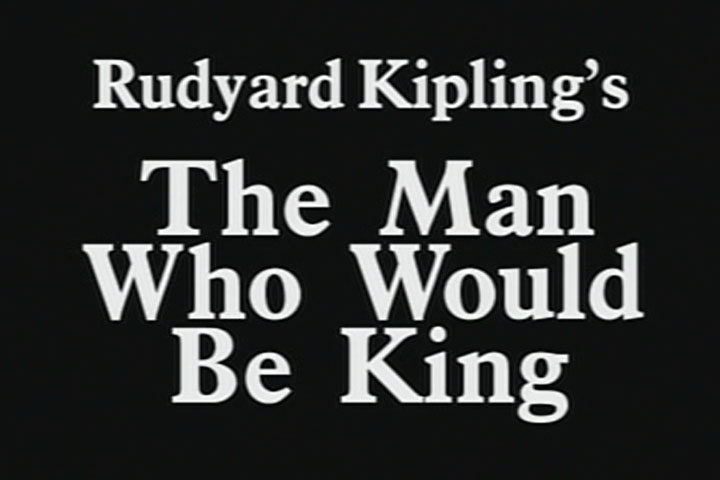
1. Title
In 1885, Rudyard Kipling, a reporter for The Northern Star newspaper, is in his office at night
when a man comes in. The man has obviously been living a hard life and asks Kipling if he knows him.
Kipling does not recognize the man at first but then realizes that he had met him three years before.
The man introduces himself as Peachy Carnehan.
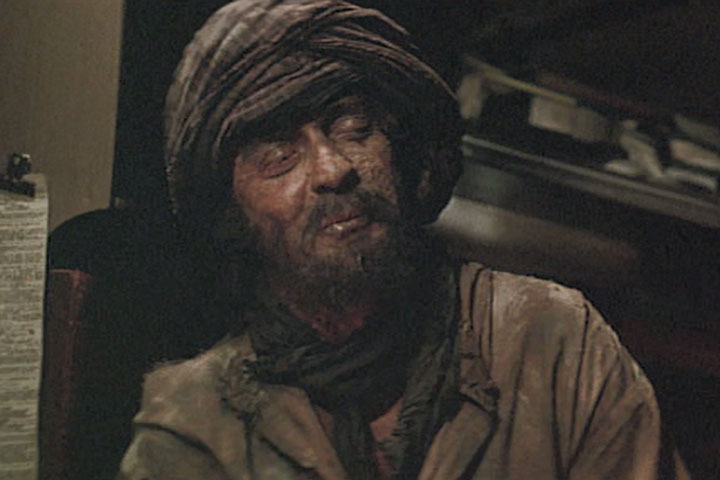
2. Peachy Carnehan tells his story
Peachy's story begins three years earlier in 1882.
He and Kipling were on a train where he stole Kipling's watch and found a Masonic emblem attached.
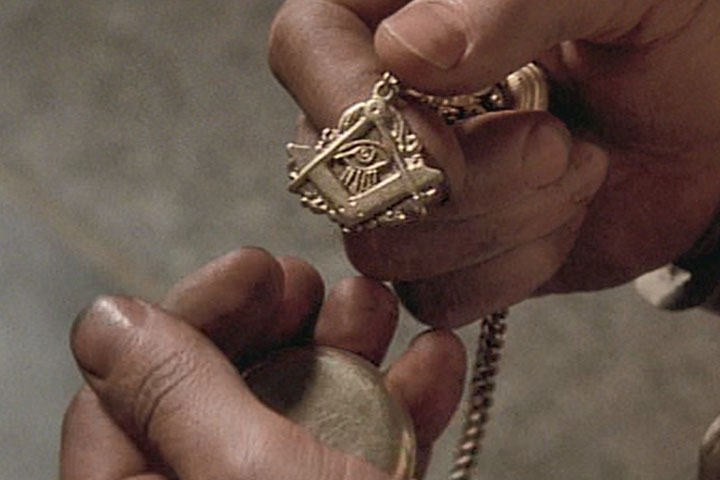
3. Kipling's Masonic emblem
Peachy realized that both men were Freemasons and returned the watch.
Kipling was able to get Peachy and his partner Daniel Dravot out of trouble with a British official.
Now Kipling is working late in his newspaper office.
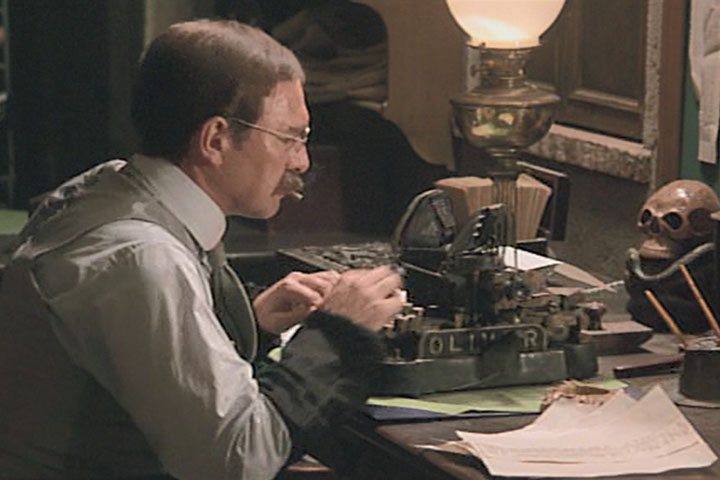
4. Kipling working late
Kipling finds that he has two visitors.
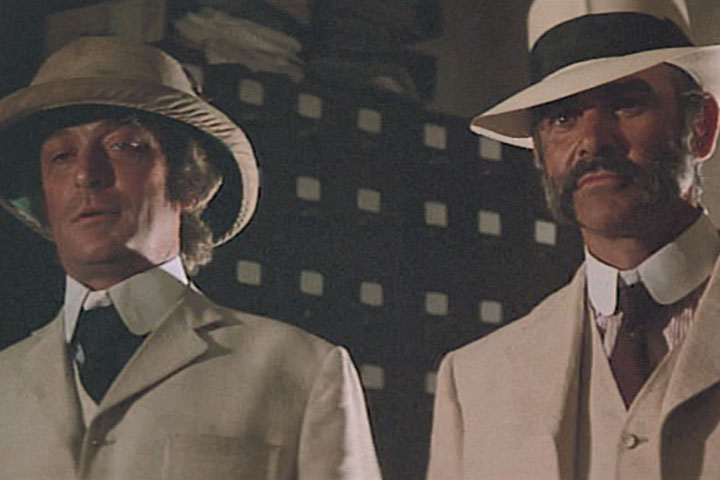
5. Peachy and Daniel arrive
Peachy and Daniel have been living by running various enterprises, some of them illegal.
They have decided that British India is to "hot" for them and want to go to Kafiristan,
a remote province in Afghanistan, with a plan to train an army and loot the area.
They know that Alexander the Great or "Sikander" passed through there in BC 328.
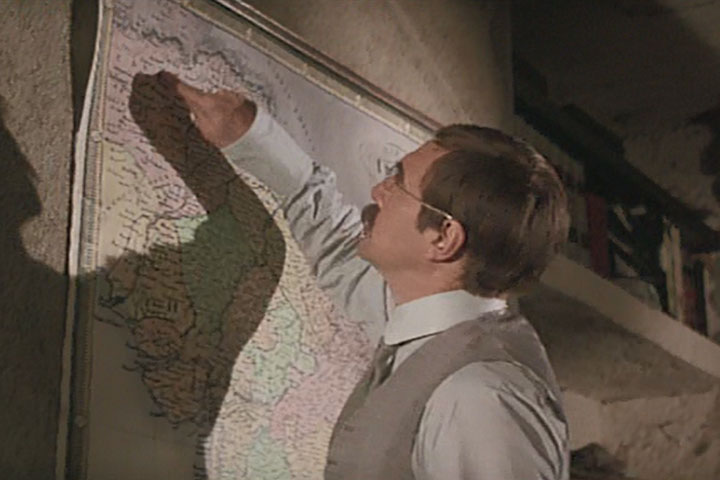
6. Kipling and map
Kipling points out the area but advises them not to go there as the country is dangerous.
They decide to go anyway and Kipling gives them advice along with his Masonic emblem.
The men buy supplies, disguise themselves as natives, and head out.
They are able to cross into Afghanistan and head north to Kafiristan, located on the other side of
high mountains.
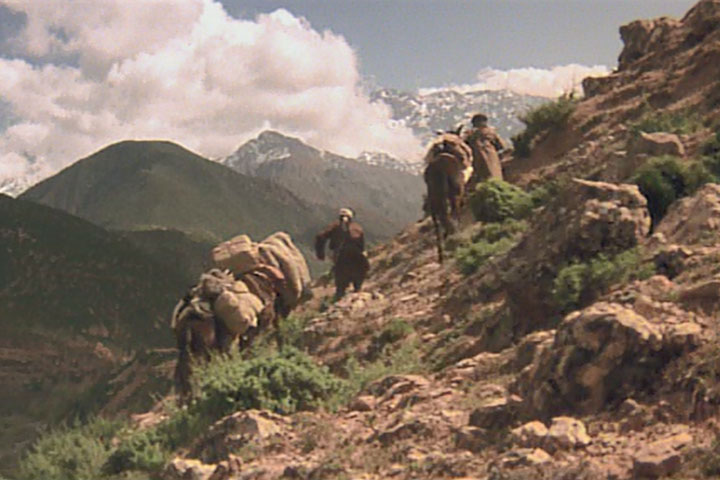
7. Climbing into the mountains
The men are now in the mountains.
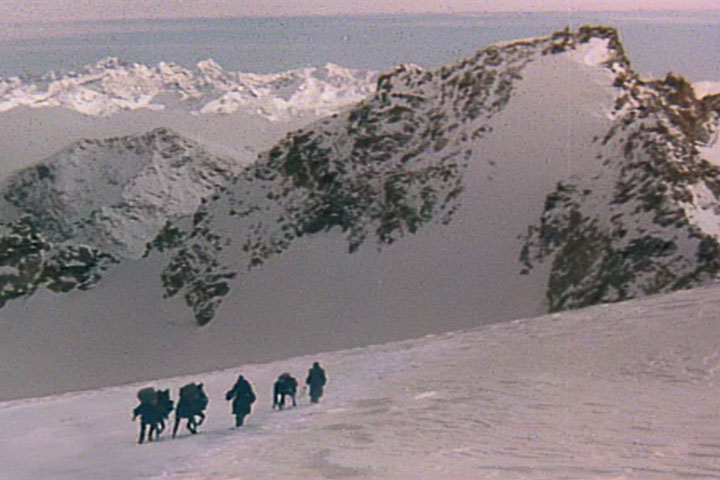
8. Crossing the snows
Emerging from the mountains they find themselves in Kafiristan and do not know the language.
They encounter the village of "Er-Heb" and then a former British Army Gurkha soldier living there.
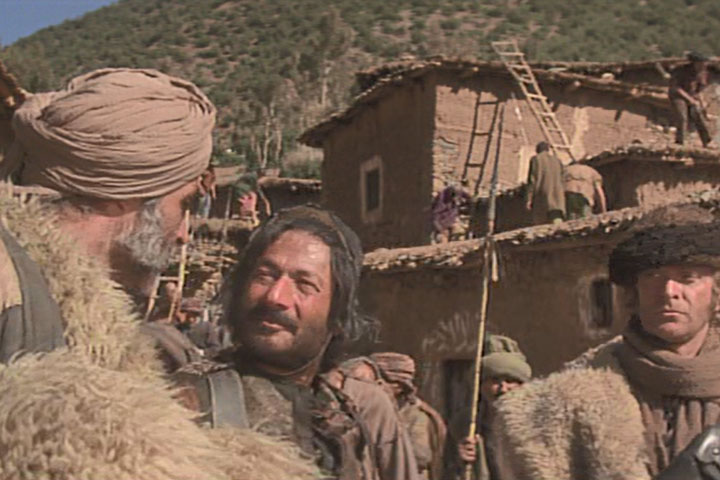
9. The lads meet Billy Fish
The Gurkha is named Majendra Bahadur Gurung but is called "Billy Fish."
He is the lone survivor of a British mapping expedition years before and acts as an interpreter.
The Er-Heb villagers have been attacking or defending themselves against other villages for a long time.
Peachy and Daniel have brought 20 rifles with them and use them to arm the villagers.
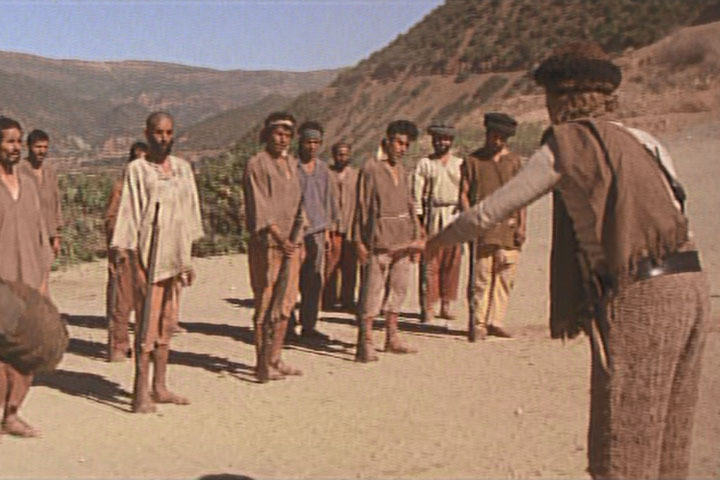
10. Peachy training the troops
Finally they are ready.
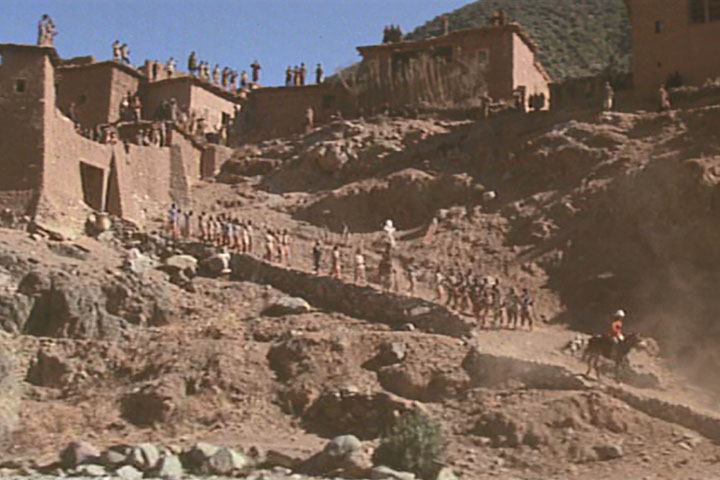
11. Moving out
The Englishmen head out with their "army" to attack a neighboring village.
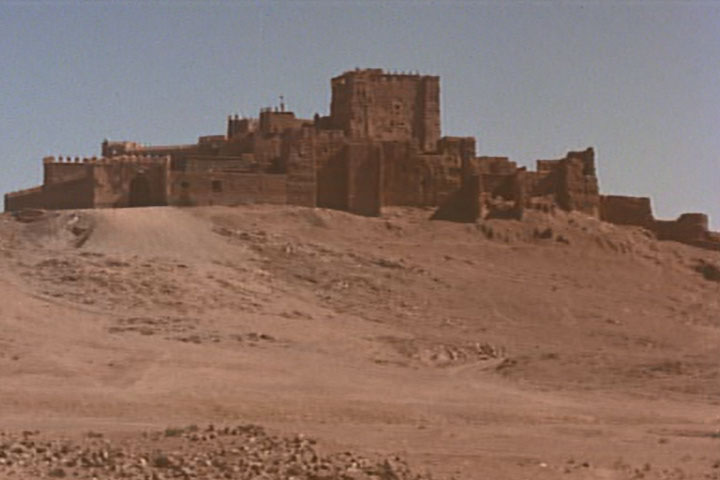
12. Castle
The neighbor villagers live in an old castle.
The Er-Heb people win the battle (helped by the rifles) but the Englishmen order no post-battle killings
and only a small amount of looting.
Some loot is brought to the Englishmen.
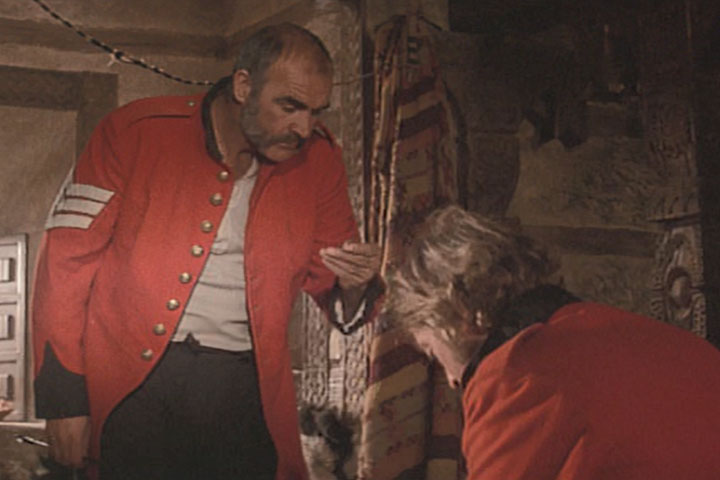
13. Daniel examines a coin
He calls it a "gold coin, pretty well worn." Unfortunately the coin isn't shown.
The soldiers spot something more interesting.
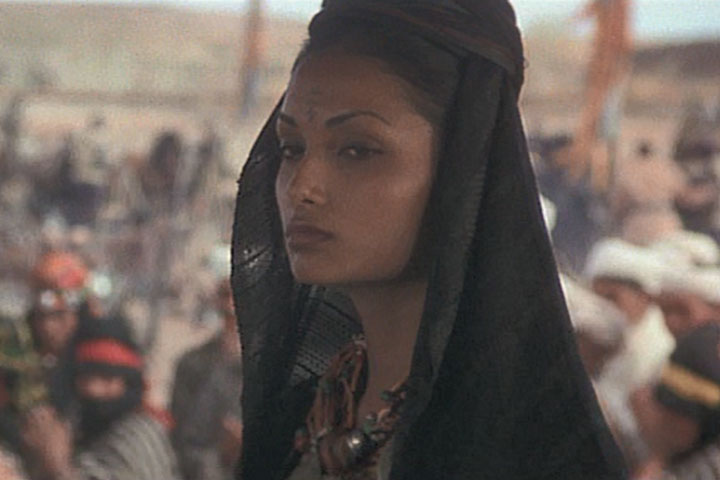
14. Roxanne appears
This is more than a coincidence as when Alexander the Great conquered the area, he married a
local girl named Roxanne.
After some time, the two soldiers are invited to the "holy city" of Sikandergul or "City of Alexander."
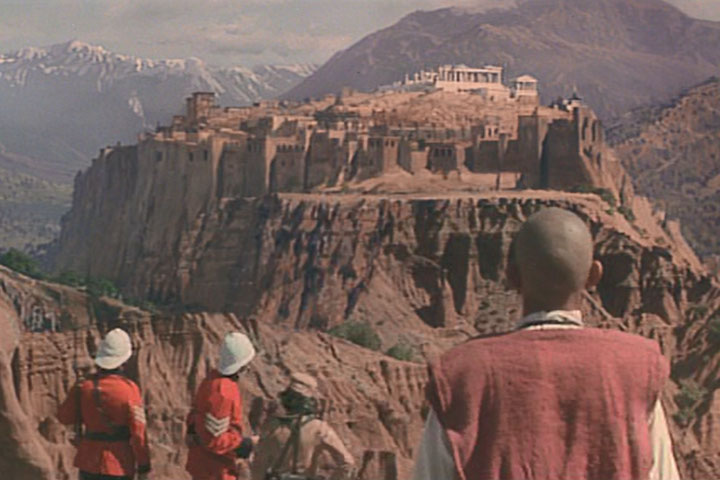
15. The holy city
The priests living there have heard that Daniel was struck by an arrow and not harmed.
They grab Daniel and want to repeat the event.
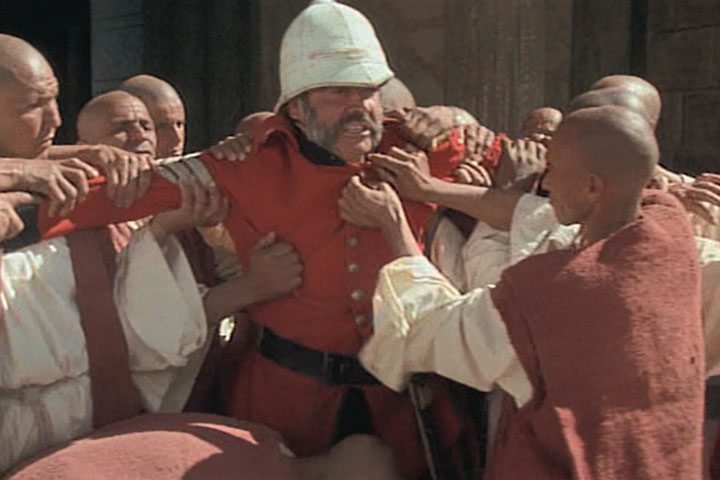
16. Daniel in trouble
The priests pull off Daniel's shirt revealing his Masonic emblem.
They are amazed and take Daniel to a rock and lift it up revealing an ancient emblem.
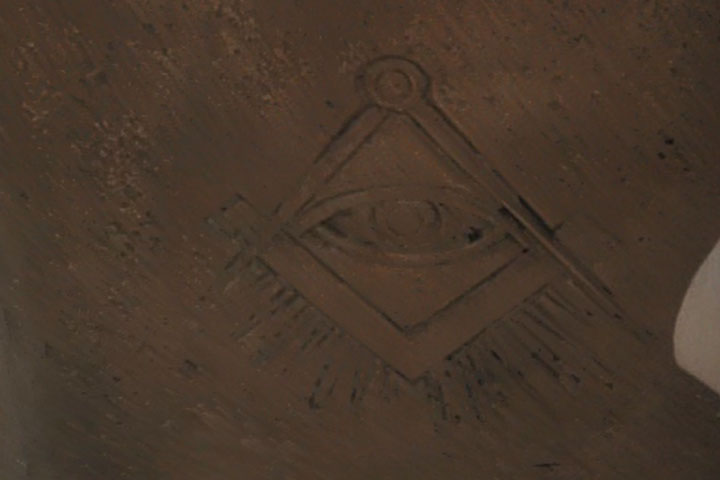
17. The emblem of Alexander
The priests now believe that Daniel is a god and the son of Alexander who has sent him.
They crown Daniel as the king.
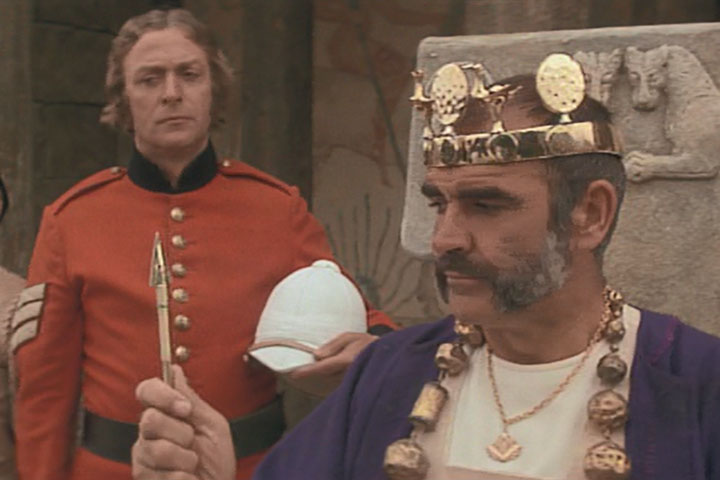
18. King Daniel
Some time later the priests take the two Englishmen to a treasure room.
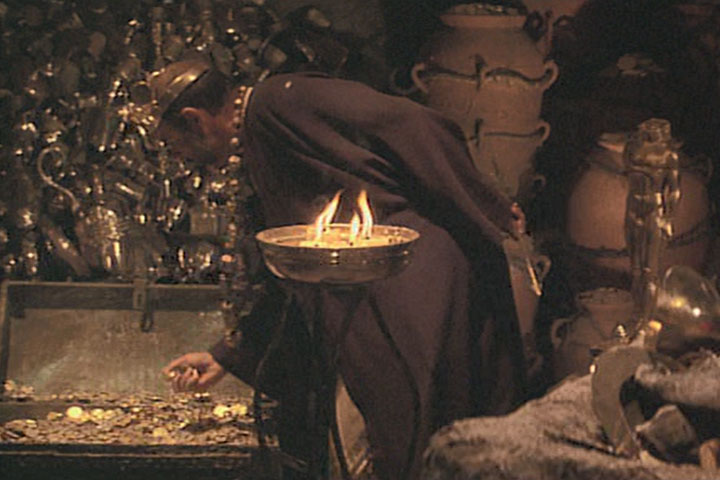
19. Daniel examines the goods
Daniel picks a large gold coin.
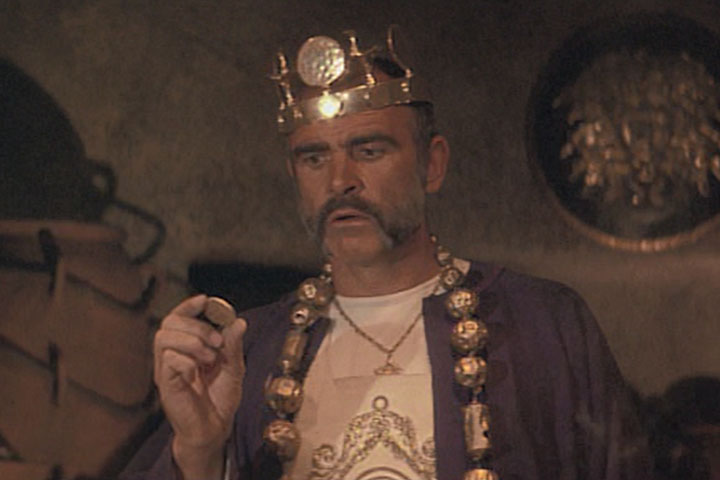
20. Daniel holding coin
The gold coin is large with a man's head on it which Daniel recognizes as Alexander.
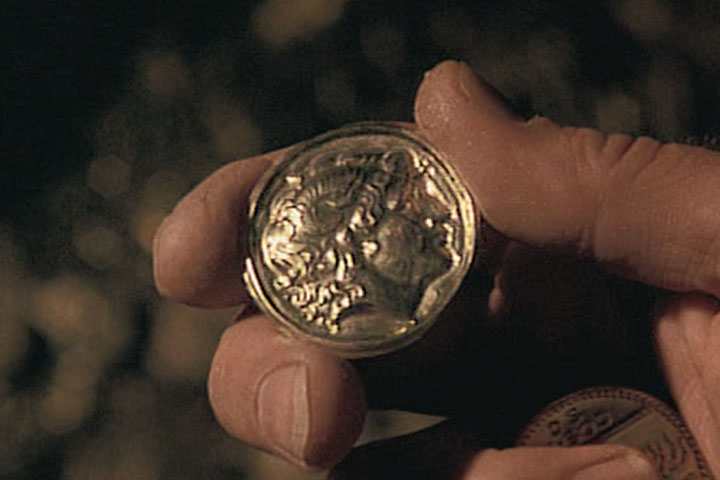
21. Coin of Alexander
Only the obverse of the coin, similar to an Alexander tetradrachm, appears.
The coin in the film is an large imitation prop coin to better show on the screen.
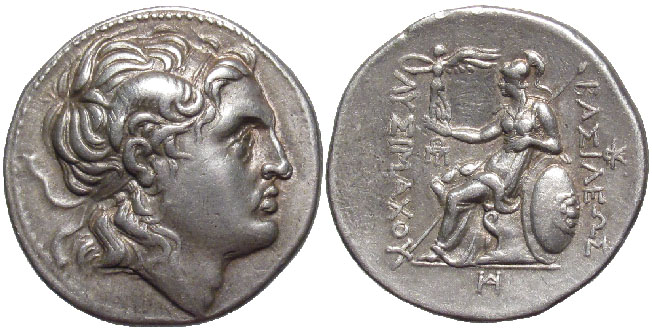
22. A tetradrachm from the period of Alexander
Silver, 30 mm, 17.14 gm
Struck: BC 288-281 (about)
This coin was issued in Thrace, Greece by one of Alexander's successors, Lysimachos.
Obverse: Head of Alexander the Great wearing the Horn of Ammon
Reverse: Athena left on throne, left arm on shield, spear on right side
Struck: BC 288-281 (about)
Reverse: Athena left on throne, left arm on shield, spear on right side

23. Coin of Rome
This image is part of the previous image but rotated 180 degrees to highlight the Roman coin.
The Roman coin reads "COS II S C" under a chariot and four horses, and matches an imitation
Roman coin of Emperor Lucius Verus (AD 161-169).
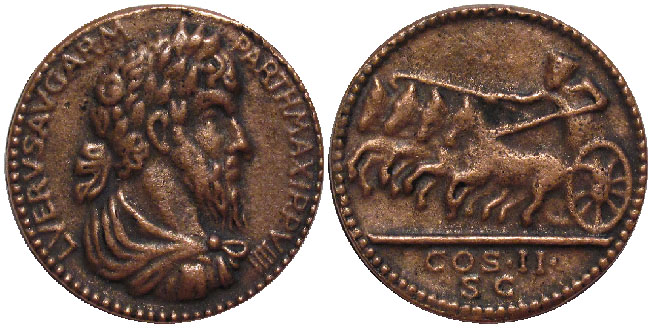
24. Lucius Verus Imitation Roman Coin with Chariot
Bronze, 35 mm, 18.10 gm
The design is based on medals created by the 16th century medalist Giovanni Cavino "The Paduan" This is a modern manufactured fake coin designed to be sold to tourists visiting ancient sites.
Obverse:
Lucius Verus facing right
L VERVS AVG ARM PARTH MAXI RP VIIII
Reverse:
Man driving a quadriga, a chariot with four horses
COS II / S C in exergue
The design is based on medals created by the 16th century medalist Giovanni Cavino "The Paduan" This is a modern manufactured fake coin designed to be sold to tourists visiting ancient sites.
Lucius Verus facing right
L VERVS AVG ARM PARTH MAXI RP VIIII
Man driving a quadriga, a chariot with four horses
COS II / S C in exergue
The Roman emperor on the coin, Lucius Verus, was the co-emperor with Marcus Aurelius
from AD 161 to 169, centuries after the time of Alexander the Great.
A gold plated version of this coin appears in the 1988 film "The Last Temptation of Christ."
Back to the film:
Daniel likes his role as king and begins to believe that he really was sent by Alexander.
The two Englishmen had previously agreed to leave with some loot when the mountain snows
had cleared, but now Daniel wants to stay there and marry Roxanne.
King Daniel tells his plan to the priests who don'st believe it is right for a god to marry a mortal woman.
The priests will let "Imbra", the "head god", decide if the marriage is allowed.
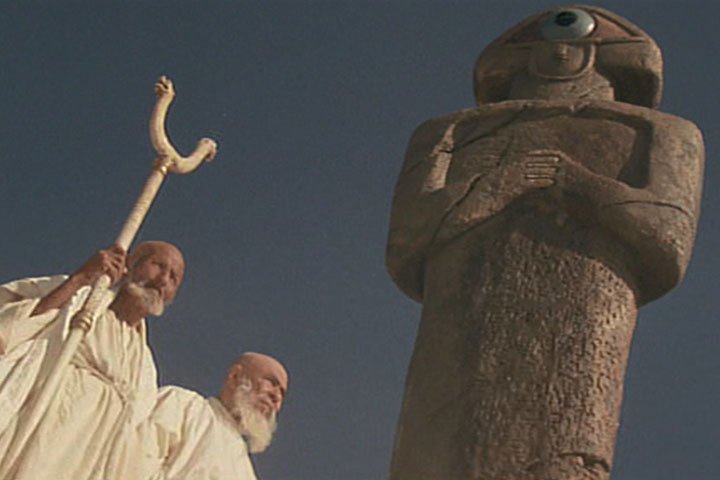
25. Imbra will decide
Billy Fish tells Daniel that the village animals are in bad shape and that the residents believe the
upcoming marriage has offended Imbra the god.
Daniel goes ahead with the wedding.
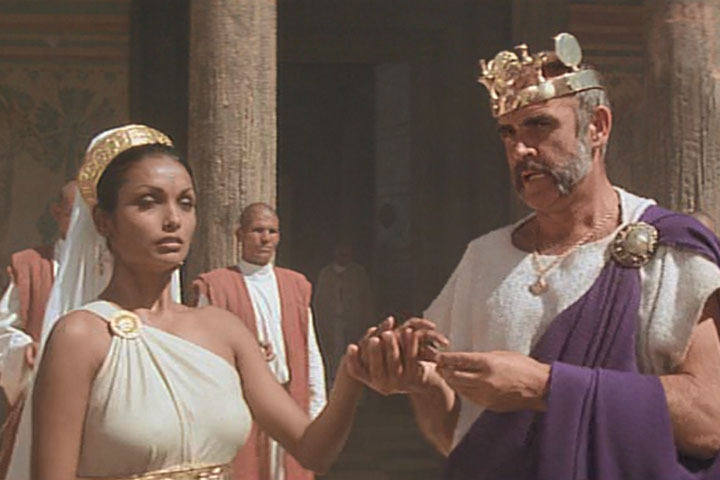
26. Wedding
The wedding is performed for Daniel and Roxanne.
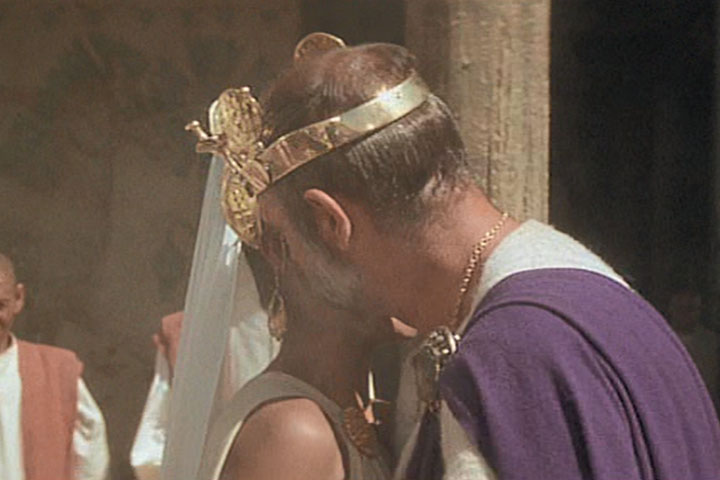
27. Kissing the bride
Roxanne bites Daniel and the blood from the wound alerts the priests and villagers that
Daniel is not a god as gods don't bleed.
The two Englishmen and Billy flee the village and fight their way over a bridge.
Billy is killed in the battle, dying like a true English soldier.
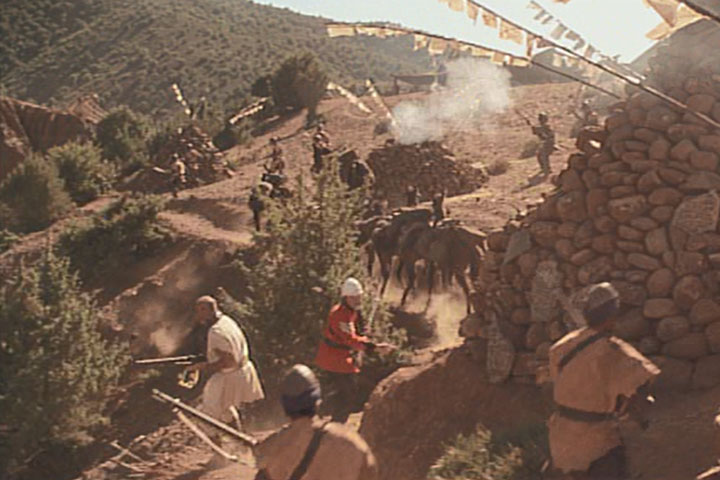
28. Battle
Villagers are at both ends of a bridge, King Daniel is in the middle, and a priest cuts a support rope
causing the bridge to collapse.
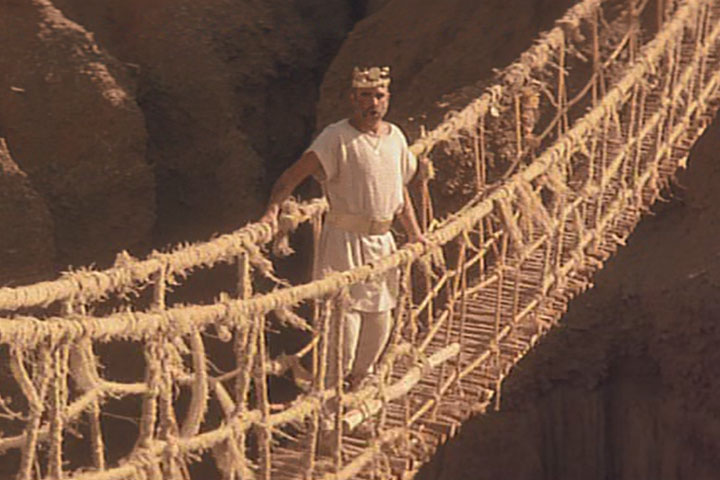
29. King Daniel on the bridge
The bridge collapses with Daniel falling into the gorge.
Now the scene is back in Kipling's office and Peachy ends his story by telling that the villagers
crucified Peachy but found him alive the next day and let him go.
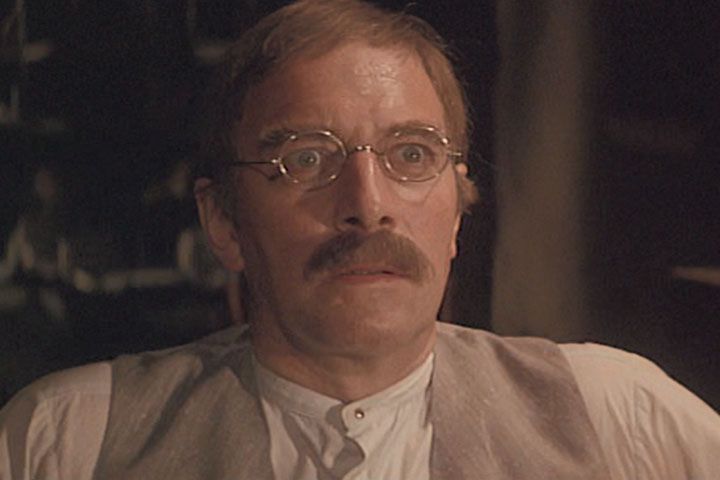
30. Kipling shocked
Peachy pulls out a large cloth bag which he leaves on the desk as he exits the office.
Kipling suspects what is in the bag.
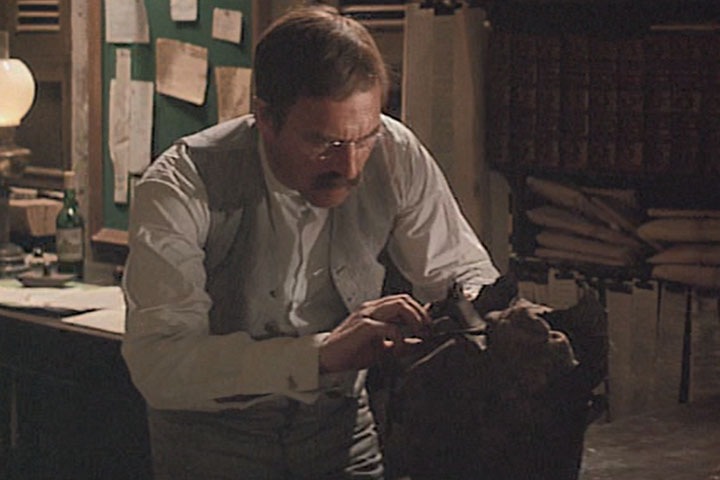
31. Kipling examines the bag
He finds what he expected to find.
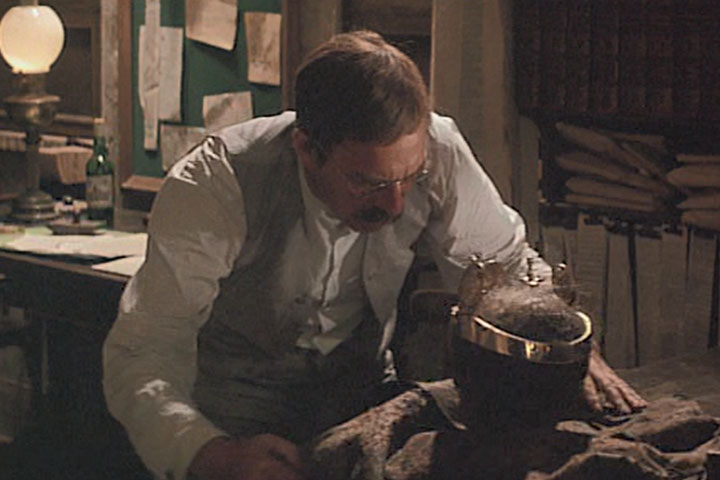
32. Still wearing the crown
Cast, Directors, Writers:
Sean Connery as Daniel Dravot
Michael Caine as Peachy Carnehan
Christopher Plummer as Rudyard Kipling
Saeed Jaffrey as Billy Fish
Shakira Caine as Roxanne
Director: John Huston
Writers: John Huston, Gladys Hill, Rudyard Kipling (novel)
Michael Caine as Peachy Carnehan
Christopher Plummer as Rudyard Kipling
Saeed Jaffrey as Billy Fish
Shakira Caine as Roxanne
Writers: John Huston, Gladys Hill, Rudyard Kipling (novel)
| Prev | Back | Next |